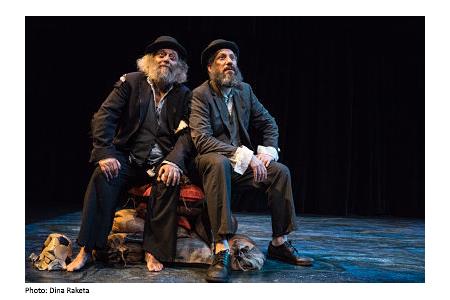

Posted 1/8/19

“I can't go on. I'll go on.” The line, from Samuel Beckett’s masterwork Waiting for Godot, underscores the realities of the post-Holocaust world. Written in 1948-’49, Godot notes the death of millions, man’s inhumanity and his odd passivity and hope in the face of nothingness.
Beckett’s “tragicomedy in two acts” is a contemplative post-war meditation. And Yiddish seems the perfect language to execute his vision.
New Yiddish Rep has produced a deeply moving production of Waiting for Godot (Vartn Af Godot), now at The Theater at the 14th Street Y.
Shane Baker’s translation is pitch perfect, underscoring the sadness, off-kilter humor and mute horror of existence, while Ronit Muszkatblit’s direction capitalizes on the chemistry between Estragon, known as Gogo (an excellent David Mandlebaum) and Vladimir, called Didi (Eli Rosen).
Beckett, working for the Irish Red Cross in the bomb ravaged city of St. Lo in 1946, saw misery first hand. Displaced people — camp survivors, prisoners of war — roamed the war-scarred countryside.
In similar fashion, the beaten Gogo and his friend Didi stumble about within the confines of their meager existence, waiting for rescue, in the form of Godot. Garbed in torn clothes, they pass the time in a stark landscape with a bare tree. The occasional philosophical observation is spoken amid repetitive statements. They are literally stuck in time and space
The men wait for something, anything, to halt the monotony and fear. The duo, sometimes seen as a parody of a married couple, is trapped in an existential crisis from which they cannot escape.
En route, they meet cruel Pozzo (Gera Sandler), forever badgering his slave, Lucky (Richard Saudek), held captive with a rope around his waist.
The brutality, despair, even moments of hope, seem best expressed in Yiddish. It is not only an evocative, lilting language, but defined a culture once marked for annihilation. Yet it, like the inhabitants of Godot, survives.
One of the reasons Godot endures is that it speaks to realities and absurdities, however abstract, that define the human condition. Even its rare moments of tenderness, lift the spirit. And yes, it’s no stretch to see contemporary parallels.
“Was I sleeping while the others suffered?” wonders Didi.
Director Muszkatblit has assembled a strong quartet that delivers Beckett’s worldview with pathos, hitting exactly the right tone. Mandlebaum’s Gogo can let out a wail that mines the very heart of suffering; Rosen is his ideal counterweight. Together, they capture the pain and friendship of daily existence.
The New Yiddish Rep, which staged a remarkable Death of a Salesman in 2015, has scored again. Its Waiting For Godot is intimate and emotionally raw — this version is not to be missed.
Recognition or lack thereof, is the theme of The Other Mozart, which addresses a neglected genius in her own right: Maria Anna (Nannerl) Mozart. A child prodigy and virtuoso, she was acclaimed throughout Europe.
Nannerl (Sylvia Milo or Paulie Rojas) and her brother, Wolfgang Amadeus, performed before crown heads to acclaim. But unlike her unruly sibling, Nannerl, a few years older, was imprisoned by gender. “Women do not play the violin,” her father thunders, allowing her only to play the harpsichord and fortepiano.
Societal pressure forced her to stop performing and composing as a young teen, a judgment that proved crushing. We learn as much about her famous brother as we do about Nannerl, and the suffering that ensues when gender trumps talent.
The Other Mozart, which has played both here and abroad, including in Salzburg, Mozart’s birthplace, and Vienna, is touring the U.S. through March. Her story is told with style and arched humor, simply and beautifully. Milo, who wrote the play, has resurrected a voice that deserved to be heard. For more information: theothermozart.com/ —Fern Siegel